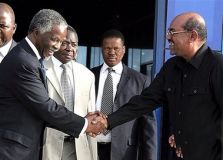Sudan rules out UN force as Mbeki visits
JUne 20, 2006 (KHARTOUM) — Sudanese President Omar Hassan al-Bashir ruled out letting U.N. troops into the Darfur region, saying he would not permit such a deployment as long as he was in power, the state news agency said on Tuesday.
 South African President Thabo Mbeki, who arrived in Khartoum on Tuesday, is expected to keep up the pressure on Khartoum to approve a U.N. peacekeeping contingent in the western region, where African Union forces have failed to end the conflict that has driven two million people from their homes.
South African President Thabo Mbeki, who arrived in Khartoum on Tuesday, is expected to keep up the pressure on Khartoum to approve a U.N. peacekeeping contingent in the western region, where African Union forces have failed to end the conflict that has driven two million people from their homes.
“President Bashir pledged himself to lead the resistance against any U.N. military intervention if it happened in Darfur,” the state news agency SUNA quoted him as saying in a speech to members of parliament on Monday evening.
“Sudan, the first country in Africa south of the Sahara to win independence, will not be the first country to be recolonized,” the president added.
“He was resolute that that there would be no U.N. military intervention in Darfur as long as he is in power,” SUNA said.
Mbeki’s delegation went straight from the airport to meetings with Bashir and Vice President Salva Kiir, a former southern rebel who took office under a peace deal last year.
The government has also signed a peace agreement with the main rebel faction in Darfur but other groups have refused to join and the government has been resisting the parallel plan to convert the African force into a U.N. force.
GRAVE SITUATION
South African Deputy Foreign Minister Aziz Pahad said last week Mbeki hoped to persuade Khartoum to accept the African Union proposal to allow the United Nations to take over from the 7,000-member AU force, which has been struggling to monitor a widely ignored truce in the vast region.
But Sudanese Foreign Ministry spokesman Jamal Ibrahim told reporters the transfer to a U.N. force was not on the agenda.
Mbeki’s visit will also seek to strengthen implementation of the deal struck 18 months ago to end a 20-year civil war in the southern part of Sudan, Pahad said.
On Darfur, the International Crisis Group (ICG) said the peace deal had “serious flaws” and only an urgent, robust U.N. peacekeeping mission will save it.
Thousands in Darfur’s refugee camps have demonstrated daily against the accord saying it does not meet their basic demands and AU forces have been attacked by angry Darfuris.
“There is a very real danger that the international community, in its eagerness to get a deal, has brokered one that is structurally weak,” the ICG said in a report.
The conflict in Darfur began in 2003 when Darfur rebels rooted in non-Arab farming communities took up arms to demand better representation in government. The government recruited tribal Arab militias in an attempt to defeat the rebellion.
(Reuters)
